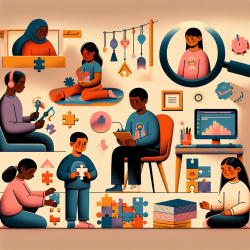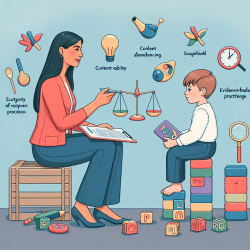Introduction
In the ever-evolving landscape of child and adolescent mental health, practitioners face the challenge of addressing complex and often comorbid conditions. The research article "Modular Approach to Therapy for Anxiety, Depression, Trauma, or Conduct Problems in outpatient child and adolescent mental health services in New Zealand" sheds light on an innovative solution: the Modular Approach to Therapy for Children with Anxiety, Depression, Trauma, or Conduct Problems (MATCH-ADTC). This approach offers a flexible, evidence-based framework designed to enhance therapeutic outcomes and service efficiency.
Understanding the MATCH-ADTC Approach
The MATCH-ADTC system was developed to address the limitations of traditional single-focus therapies, which often struggle to meet the diverse needs of youth with multiple and changing clinical presentations. By integrating modules that target anxiety, depression, trauma, and conduct problems, MATCH-ADTC provides a comprehensive toolkit for clinicians.
The system's design is rooted in data-driven decision-making, allowing practitioners to tailor interventions based on individual client needs. This flexibility is particularly crucial in settings where comorbidity is common, and clinical presentations may evolve over time.
Key Findings from the Study
The study conducted in New Zealand aims to replicate the success of MATCH-ADTC observed in the USA. Key outcomes include:
- Improved Clinical Outcomes: MATCH-ADTC has demonstrated superior effectiveness compared to usual care and standard evidence-based treatments, with significant improvements in clinical severity measures.
- Increased Evidence-Based Content: Clinicians trained in MATCH-ADTC deliver a higher proportion of evidence-based therapy content, enhancing the quality of care.
- Efficiency of Service Delivery: The modular approach optimizes clinician time and resources, potentially reducing the duration of therapy while maintaining or improving outcomes.
Implications for Practitioners
For practitioners, the adoption of MATCH-ADTC offers several advantages:
- Comprehensive Training: The MATCH-ADTC system includes a robust training program, equipping clinicians with the skills to implement evidence-based interventions across a range of disorders.
- Adaptability: The modular nature of MATCH-ADTC allows for customization of therapy to suit individual client needs, promoting better engagement and outcomes.
- Data-Driven Adjustments: The use of a web-based monitoring system enables real-time tracking of client progress, allowing for timely adjustments to therapy plans.
Encouraging Further Research
While the MATCH-ADTC approach shows promise, ongoing research is essential to refine and expand its application. Practitioners are encouraged to contribute to the growing body of evidence by participating in studies and sharing their experiences with the system.
Furthermore, exploring the effectiveness of MATCH-ADTC across diverse populations, including indigenous and minority groups, will ensure its applicability and cultural sensitivity.
Conclusion
By embracing the MATCH-ADTC framework, practitioners can enhance their therapeutic repertoire, improve outcomes for children and adolescents, and contribute to the advancement of mental health services. The integration of modular therapy into practice not only aligns with evidence-based standards but also empowers clinicians to deliver personalized, effective care.
To read the original research paper, please follow this link: Modular Approach to Therapy for Anxiety, Depression, Trauma, or Conduct Problems in outpatient child and adolescent mental health services in New Zealand: study protocol for a randomized controlled trial.










